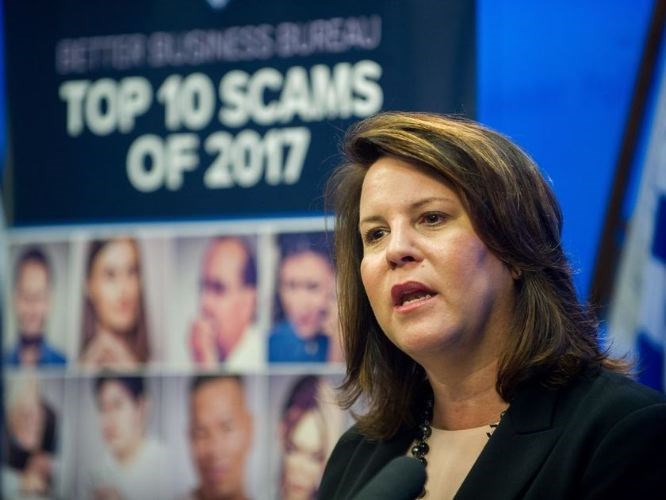As consumers increasingly flock online, so are scam artists.
At the top of the Better Business Bureau scam list for 2017 was online purchase scams, said the organization's local CEO Danielle Primrose as she announced March as fraud prevention month.
Online purchase scams can consist of fake websites, counterfeit goods, "free trial" traps and fake celebrity endorsements, she said.
The amount Canadians are known to have lost to such pitches, topping $13 million last year, trail other scams, but they are the most-reported type of scam tracked by the BBB, said Primrose.
"Ninety per cent of consumers shop online. It may seem fast and convenient," she said, but it's buyer beware more than ever because "even Amazon is still being victimized" by counterfeit wholesalers and manufacturers.
She warned consumers to deal with reputable retailers and keep in mind that "if the price is too good to be true, it probably is."
She said technology has changed the fraud scene because "you're not just dealing with the local shyster down the street. Now they're casting a net worldwide."
Last year, Canadians lost $95 million to all fraud, up from $91 million the year before. Only an estimated five per cent of fraud is reported because people are embarrassed or don't think they can get their money back, said Primrose.
"By reporting it, you may be able to prevent someone else from getting scammed," she said. "You may feel like a victim, but you're not alone."
The other nine top scams are:
- Wire fraud, also known as "spearfishing," scammed Canadian businesses out of $20 million last year. The fraud artists target businesses by researching the firm and then posing as the CEO to direct employees to send money by wire or email.
- Dating scams burned the lovelorn of $19 million, up from $17 million the year before, said Primrose. An estimated 25 per cent of dating profiles are fake, so be wary "if they're way too eager at the start of a relationship."
- Dodgy employment offers scammed Canadians out of at least $5 million last year, and the BBB reminds people that "If you didn't apply, you didn't get hired. A legitimate company would not ask you to wire money as a 'test.'"
- Fraudsters are tapping into bitcoin mania, ripping off investors of at least $1.7 million last year. The B.C. Securities Commission received 50 complaints about cryptocurrency scams and there have been 37 warnings issued, said Doug Muir of the B.C. Securities Commission.
There are thousands of these and they are high-risk and unregulated, he warned. Investors should seek advice from a qualified adviser before buying into something that is usually being touted as something that investors have to act quickly on. Fraudsters usually point to slick websites and social media traffic to boost the appeal.
The problems include coins going missing, an inability to cash out on an investment, and the sale of bitcoins to raise money for ventures that are fraudulently inflated (also known as pump and dump).
"There is virtually no way for people to get their money back," said Muir.
- Technology is also being used in the old income tax scam, through which Canadians threatened with jail for not paying sufficient taxes reported losing $5 million last year. The scammers are now directing their victims on how to purchase bitcoins to pay Canada Revenue Agency, said Primrose.
- The enticement of dubious weight-loss schemes costs Canadians an untold amount of money, according to the BBB. The Competition Bureau of Canada this year stopped an untested weight-loss device from being sold in Canada when it reached an agreement with Thane Canada to pay a $350,000 fine and to not market its AbTronic X2 and AbCommand iX2, electronic muscle stimulation devices marketed with false advertising, said assistant deputy commissioner Victor Hammill.
- Shady lenders offering advance fee loans cost Canadians $1.5 million in losses last year. "If you're approved for a loan and they request money as security, walk away," said the BBB.
- Contractors who make unsolicited offers of work, take deposits and disappear cost Canadians at least $3 million last year.
- Fake invoices for unknown losses involves phishers flooding email boxes with realistic-looking invoices. Never click on links or send personal or financial information.
The Competition Bureau publishes the Little Black Book on Scams online at competitionbureau.gc.ca, which encourages victims to report a scam, including to the Canadian Anti-Fraud Centre, at antifraudcentre.ca, or 888-495-8501.



